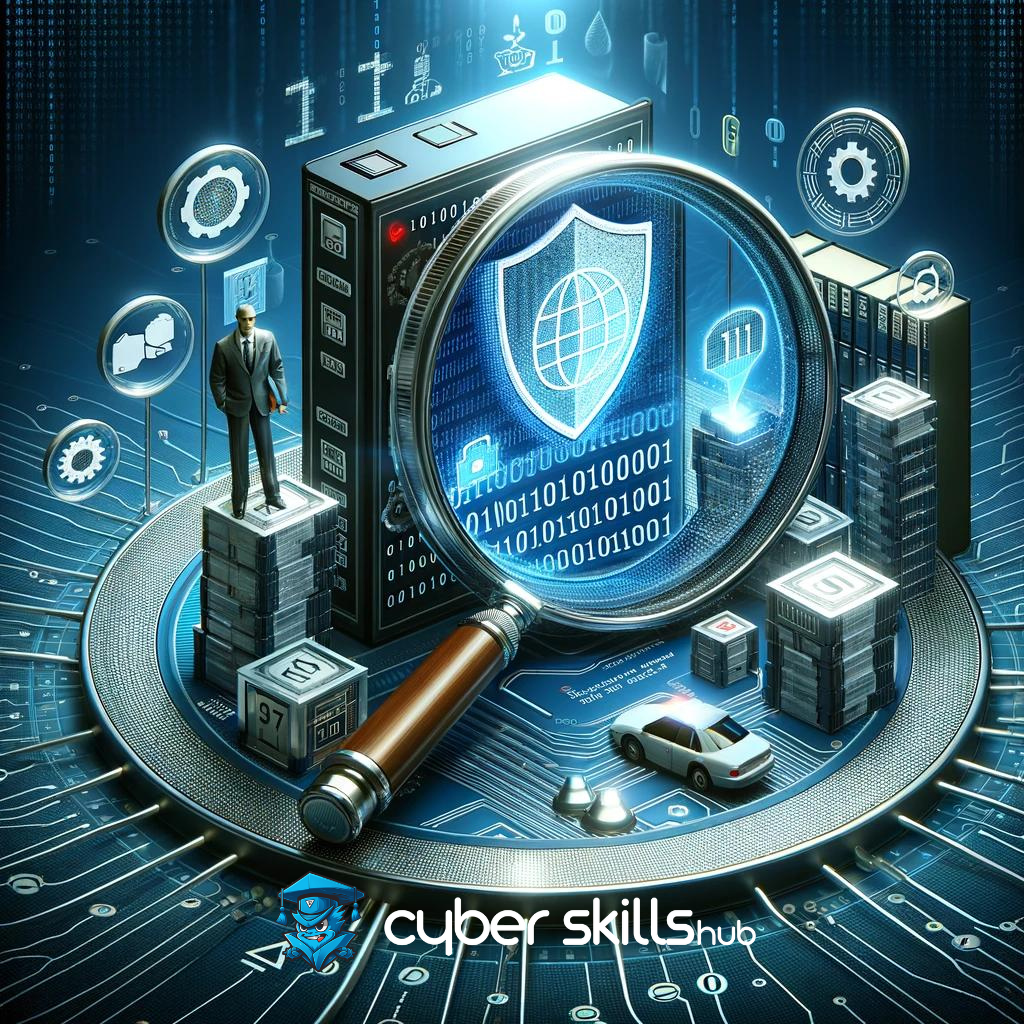Currently Empty: $0.00

Deleting data can cause irreversible loss.
Forensic IT professionals race against time to recover information vital to criminal investigations. Digital traces can be quickly erased, and this can become a critical battle for evidence preservation.
With the rigor required by legal processes, forensic IT experts are tasked with analyzing deleted data, encrypted files and identifying the tracers behind cyber-attacks. This specialization requires a high level of technical knowledge and a strict sense of ethics.
Forensics is the foundation of the cybersecurity world.
What is Forensic Informatics Specialization?
Forensic IT expertise plays a critical role in collecting, preserving, analyzing and presenting digital evidence in criminal investigations and legal matters. These experts, who undertake tasks such as understanding the methods used by cybercriminals, examining malware and tracking digital traces, are the detectives of the digital world. Their analyses have an important place in the elucidation of crimes and the execution of justice.
Forensic IT professionals also play a strategic role in ensuring information security. These professionals contribute greatly to protecting critical data, preventing breaches and increasing the cyber defense capacity of institutions. It is the responsibility of forensic informatics experts not only to find information, but also to use it in a fair and lawful manner.
Basic Concepts in Forensic Informatics
Forensic informatics is a science that enables digital data to be used as evidence in legal processes. This discipline requires technical expertise and detailed analysis.
The forensic IT sector is growing rapidly and is vital in the fight against complex cybercrime.
Protecting the integrity of digital evidence is essential; therefore, every step requires great care and adherence to standards. Data collection, storage and reporting procedures form the backbone of forensic processes.
Continuous training is essential for professionals, both to keep up with technological developments and to comply with legal regulations. To this end, our courses, such as Cyber Threat Intelligence Training, are designed for professionals who want to learn the latest methodologies and techniques in the field. These competencies are important elements that distinguish forensic IT professionals from other IT professionals.
Skills and Competencies Required for Specialization
Solid analytical thinking is required.
Analytical thinking, inquisitive approach and attention to detail are important for forensic IT experts. You can attend our Cyber Security Fundamentals Training course to develop these skills. Protecting the accuracy and integrity of evidence requires not only technical skills, but also a deep understanding of the legal framework and processes. In particular, the ability to analyze complex data structures and systems is fundamental to this specialization.
Fast learning and adaptability are essential.
Developments in the cybersecurity world are advancing rapidly and it is important for forensic informatics experts to gain this skill set in order to stay up-to-date in the face of new technologies and threats. In this field, deep technical expertise and knowledge of current cyber threats are a must.
Effective communication skills are mandatory.
For tips on how to develop this competency, please see our IT Law: Basics and Highlights content for tips on developing this competency.
The ability to communicate the results of forensic analysis in clear and understandable language to legal professionals and courts is vital for forensic scientists. This requires excellent written and oral communication skills, as well as the ability to simplify complex technical issues and present them appropriately to different audiences.
Training Roadmap and Certifications
For those who want to specialize in forensic informatics, the first steps to take are usually to acquire basic cyber security knowledge. There are formal training programs as well as various online platforms. Forensic IT certifications are an important part of proving your expertise and advancing your professional career. In this journey, certifications such as Certified Forensic Computer Examiner (CFCE), Certified Information Systems Security Professional (CISSP) and Computer Hacking Forensic Investigator (CHFI) are industry-recognized standards. In addition, real case studies and internship programs should also be important elements of this training in order to reinforce your expertise by providing practical experience.

Basic Training and Certification Programs
Trainings and certification programs covering basic knowledge are essential for becoming a forensic informatics expert. These programs provide a solid foundation in cyber security and cybercrime.
Certification processes provide in-depth knowledge on topics such as information security, cybercrime, data recovery and system penetration. Through these trainings, candidates are equipped with up to date tools and techniques in the field of forensic informatics. Aiming for prestigious certifications such as Certified Forensic Computer Examiner (CFCE) and Certified Information Systems Security Professional (CISSP) to certify their expertise contributes to their professional development.
Computer Hacking Forensic Investigator (CHFI ) and similar programs are recommended for advanced training. The fact that the training content includes practical work, laboratory experiences and real-world scenarios plays an important role in reinforcing the knowledge gained. In addition to the accreditation provided by these certificates, internships and practical case studies are also valuable in thecareer journey.
Following the training process, completion of certification increases professional acceptance and job opportunities in the industry. In addition, participation in continuing education and certification renewal programs is vital to stay current with ever-changing cybercrime methods and technology. Professionals are expected to keep abreast of innovations in the field and adopt a continuous learning approach.
Recommended Courses for Advanced Specialization
In particular, advanced courses for forensic IT professionals who want in-depth knowledge of Advanced Persistent Threat (APT) issues are highly valuable.
Courses such as Reverse Engineering, Malware Analysis and Cryptanalysis are indispensable to learn analysis and response techniques for advanced cyber threats and to master topics such as malware analysis, network security and crypto-analytical techniques. These courses provide the necessary know-how to develop defense mechanisms against sophisticated cyber-attacks and analyze the tactics of malicious actors. For professionals who want to deepen their knowledge, these courses are an important step in creating a competitive advantage.
Digital Forensics Expert and Incident Response Analyst courses are also recommended for candidates who want to develop advanced analytical skills. These courses are necessary to analyze complex scenarios that may be encountered in forensic processes and to work effectively.
Courses such as Cybersecurity Engineering and Security Architecture Design provide knowledge on how to protect systems and build advanced security architectures. They provide an in-depth understanding of how to design and implement security solutions, both strategically and operationally. The main goal is for professionals to understand high-level threat models and use this knowledge to shape effective security policies.
Forensic Laboratory and Tools
A forensic laboratory is a specialized environment where digital evidence is handled, preserved and analyzed. In these laboratories, experts use different tools to perform data recovery and analysis without intervention.
The core components of an effective forensics laboratory should include software and hardware tools, as well as operational procedures and security protocols. For example, commercial tools such as Encase, FTK or X-Ways are preferred for data imaging and analysis, while open source solutions such as Autopsy or Sleuth Kit are also in wide use.
The success of forensic analysis processes depends on the accuracy and reliability of the tools used. Therefore, the selection of up to date and standards-compliant tools is critical.
Installation and Terms of Use
The installation of software and hardware tools used in forensic informatics requires care and attention. First, a secure environment must be created.
Every software and hardware needs specific usage guidelines and configuration settings. The expert should periodically test the accuracy of these settings and the integrity of the system. Continuous research and development activities should be carried out in order to stay up to date in the field of cyber security.
For an effective analysis and review process, each of the tools used must be thoroughly understood and applied. However, it is essential to establish harmonized systems for these tools to work in an integrated manner. There should be a seamless workflow in terms of data transfer and functionality between tools.
During the use of forensic tools, great importance should be attached to preserving the integrity of evidence. In this context, processes such as hash checking to verify the authenticity of data have become standardized. Continuously updated security protocols play a critical role in minimizing the risks of evidence manipulation.
In hardware installation, there are many factors that need to be considered, especially in the protection of digital data that will be used as evidence. These include physical security, temperature control and electromagnetic field protection.

Mandatory Software and Hardware Tools
Essential software tools for forensic analysts are critical for various analysis processes. These include disk imaging, decryption, data analysis and tracing programs. It is the forensic scientist’s responsibility to ensure that each tool performs the task for which it was specifically designed with precision.
In particular, disk imaging is possible with forensic image software, which allows data to be copied without compromising its originality. This software creates bit-level copies of disks, allowing data integrity to be preserved in forensic examinations.
Hardware tools are specifically designed for the collection and analysis of physical evidence. These include write-protected disk cloners, mobile device analysis kits, and network traffic captures. The appropriate use of this hardware increases the forensic sufficiency and admissibility of the evidence obtained.
The effective use of software and hardware tools, their continuous updating, and their system compatibility are some of the success criteria for forensic experts. These tools are used in a wide range of areas, from the creation to storage, analysis and reporting of forensic evidence. Therefore, it is an inevitable requirement for experts to follow the innovations in the sector and continuously improve themselves through trainings. Keeping abreast of the latest forensic technologies and adopting the best practices is a key feature that demonstrates the professional competence of every forensic IT expert.
Career Planning and Employment Opportunities
Forensic Informatics Specialization is a qualified career path where law and technology interact. Specializing in this field offers a wide range of employment opportunities. There are many different positions in the public and private sectors.
Especially as the importance of combating cybercrime increases, the need for forensic informatics experts is also increasing significantly. Career opportunities are available in many fields, from banking to the defense industry, from government agencies to individual consulting firms. This leads to the continuous creation of new job positions depending on areas of specialization and technical skills.
Individuals who want to pursue a career in forensic informatics should be open to continuous learning and development. As a dynamic sector, forensic informatics always requires innovative approaches and adaptation. This is an ideal environment for individuals with an investigative spirit and problem-solving skills.
Sectoral Demands and Areas of Specialization
Forensic informatics has become an indispensable part of legal processes with rapidly developing technology. The demand for experts in this field is constantly increasing and diversifying.
Within the sector, there are a wide range of areas of expertise, from cyber security to data recovery, from network security analysis to the examination of digital evidence. Forensic Informatics Experts work on issues such as developing defense mechanisms against various cyber attack scenarios, protecting sensitive data and preventing leaks. In addition, they also provide consultancy services to ensure legal compliance and compliance with regulations. Each area of specialization requires in-depth technical knowledge and mastery of constantly updated technologies.
In addition to corporate companies, government bodies also need forensic informatics experts. The role of forensic informatics experts is critical, especially in processes such as investigating digital crimes, collecting and analyzing criminal evidence. These processes require extensive training series and detailed studies.
Forensic IT experts perform tasks that require high responsibility, which increases the prestige and importance of the field. Proactively preventing cyber threats, especially at the corporate level, and developing effective response strategies when they occur are some of the key skill sets for experts in the sector. The training of forensic IT professionals should include a broad curriculum covering technical and legal concepts and provide opportunities for continuous professional development and training.
Career Steps in Forensic Informatics
Progressing along the career path of forensic informatics expertise requires patience and continuous learning. Experts need to have multi-layered knowledge and skills.
- Entry Level Positions: Typically at this stage, basic competencies are gained in identifying vulnerabilities in systems and collecting digital evidence.
- Intermediate Positions: At this level, the ability to work with advanced tools to manage more complex investigations and conduct forensic analysis is required.
- Senior Level and Specialization: As seniority is gained, competencies such as strategic planning, forensic incident response and leading complex forensic investigations come to the fore.
Gaining experience in forensic informatics is possible through high quality education and continuous professional development.
Certifications and real-world experience gained throughout your career are the cornerstones of becoming an expert in this field.
Frequently Asked Questions About Forensic Informatics Specialization
Which trainings are needed to become a forensic informatics expert?
To become a forensic informatics expert, it is necessary to attend certification programs covering topics such as cybersecurity basics, data recovery, system penetration. Real case studies and internship programs are also important.
What are the main tasks of forensic informatics experts?
The main tasks of forensic IT specialists are to collect, preserve, analyze and present digital evidence in legal proceedings. They also play a critical role in ensuring information security.
Which certificates are important for forensic informatics specialization?
In the field of forensic informatics, certifications such as Certified Forensic Computer Examiner (CFCE), Global Information Assurance Certification (GIAC) Certified Forensic Analyst (GCFA), and Computer Hacking Forensic Investigator (CHFI) are accepted standards in the industry.
Which skills are particularly important for forensic scientists?
Sharp analytical thinking, fast learning, adaptability and effective communication skills are vital for forensic IT professionals. These skills include an understanding of legal processes as well as technical details.
What are the working areas of forensic informatics experts?
Forensic informatics experts can work in the public and private sectors, from banking to defense industry. They are involved in tasks such as combating cybercrime, data protection and leakage prevention.
What are the main tools used in forensic laboratory?
Tools commonly used in forensic labs include commercial software such as Encase, FTK, X-Ways and open source solutions such as Autopsy, Sleuth Kit. These tools are preferred for data imaging and analysis.

